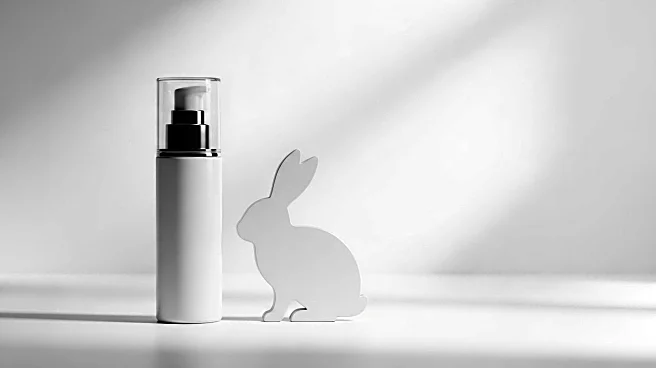What is the story about?
What's Happening?
Members of the European Parliament (MEPs) are urging the European Union to uphold and enhance the ban on animal testing for cosmetics amidst revisions to key regulations. The Cosmetics Product Regulation (CPR) and the REACH regulation, which governs chemical safety, are under review. Nine MEPs have signed a letter calling for the protection and strengthening of the existing ban on animal testing for cosmetics. They advocate for the promotion of cruelty-free scientific innovation and the development of non-animal testing methods. The letter also emphasizes the need for an ambitious roadmap to phase out animal testing across all scientific areas, positioning Europe as a leader in humane innovation. The initiative is supported by 14 NGOs, including Cruelty Free Europe, which organized the effort to coincide with European Day for Humane Science.
Why It's Important?
The call to strengthen the ban on animal testing for cosmetics is significant as it reflects growing public and political pressure to adopt more humane scientific practices. If successful, this initiative could lead to a shift in the cosmetics industry towards non-animal testing methods, potentially influencing global standards. The move could also enhance the EU's reputation as a leader in ethical scientific innovation, impacting regulatory practices and consumer expectations worldwide. Companies that rely on animal testing may face increased scrutiny and pressure to adapt to new standards, while those already employing cruelty-free methods could gain a competitive advantage.
What's Next?
The European Commission is expected to finalize its roadmap to phase out animal testing by March 2026. This roadmap will likely influence future legislative changes and industry practices. Stakeholders, including cosmetics companies and animal rights organizations, will be closely monitoring the Commission's actions and may engage in advocacy or lobbying efforts to ensure the roadmap aligns with their interests. The ongoing consultation process for the CPR and REACH regulations will provide opportunities for public and industry input, potentially shaping the final outcome of these revisions.
Beyond the Headlines
The push for a cruelty-free cosmetics industry highlights broader ethical considerations in scientific research and consumer products. It raises questions about the balance between scientific advancement and animal welfare, and the role of legislation in driving ethical innovation. The initiative may also inspire similar movements in other sectors, promoting a shift towards more humane practices across industries.
















